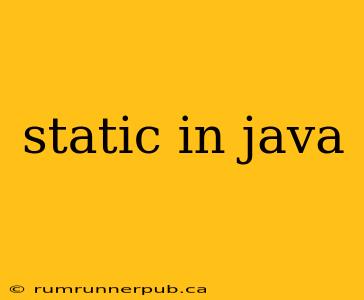The static keyword in Java is a powerful tool that can significantly impact how your classes and their members behave. Often a source of confusion for beginners, mastering static unlocks efficient and elegant code design. This article will explore the intricacies of static in Java, drawing upon insights from Stack Overflow and adding practical examples and explanations.
What is static in Java?
At its core, the static keyword in Java indicates that a member (variable or method) belongs to the class itself, rather than to any specific instance (object) of the class. This means there's only one copy of a static member shared across all instances.
Q: What is the difference between static and instance variables? (Stack Overflow)
A: Instance variables are unique to each object created from a class. Static variables are shared among all objects. If one object modifies a static variable, that change is reflected in all other objects. This is a key difference highlighted in numerous Stack Overflow discussions, often with examples comparing memory allocation and object state management.
Example:
public class Counter {
static int count = 0; // Static variable
public Counter() {
count++;
}
public static int getCount() {
return count;
}
}
public class Main {
public static void main(String[] args) {
Counter c1 = new Counter();
Counter c2 = new Counter();
System.out.println(Counter.getCount()); // Output: 2
}
}
In this example, count is a static variable. Both c1 and c2 increment the same count, illustrating the shared nature of static members. Notice that we access the static method getCount() using the class name (Counter.getCount()), not an object instance.
Static Methods and Blocks: More than just variables
The static keyword doesn't just apply to variables; it also modifies methods and blocks of code.
Q: Can a static method access instance variables? (Stack Overflow)
A: No, a static method cannot directly access instance variables. This is because static methods exist independently of any specific object. They don't have a this reference to access instance-specific data.
Q: What is a static block in Java? (Stack Overflow)
A: A static block is a piece of code within a class that gets executed only once when the class is first loaded. It's often used for initialization tasks related to static members.
Example of a Static Block:
public class StaticBlockExample {
static int value;
static {
System.out.println("Static block is executed.");
value = 10;
}
public static void main(String[] args) {
System.out.println(value); // Output: 10
}
}
The static block runs before the main method, initializing value before any objects are created.
When to Use Static Members
Static members are beneficial when:
- Data needs to be shared across all objects: Like a global counter or configuration settings.
- Utility methods are needed: Methods that don't require object-specific state, such as mathematical functions or helper methods.
- Initialization of resources: Static blocks are ideal for tasks like loading configuration files or database connections.
Potential Pitfalls
Overuse of static members can lead to tightly coupled code and hinder testability. Avoid excessive reliance on static members, particularly if they hold mutable data, as this can create unpredictable behavior and concurrency issues.
Conclusion
The static keyword provides a powerful mechanism for managing class-level data and behavior in Java. Understanding its nuances is crucial for writing efficient and maintainable code. By carefully considering its implications, developers can leverage its advantages while avoiding its potential pitfalls. Remember to consult resources like Stack Overflow for solutions to specific challenges and to learn from the experience of other developers.
